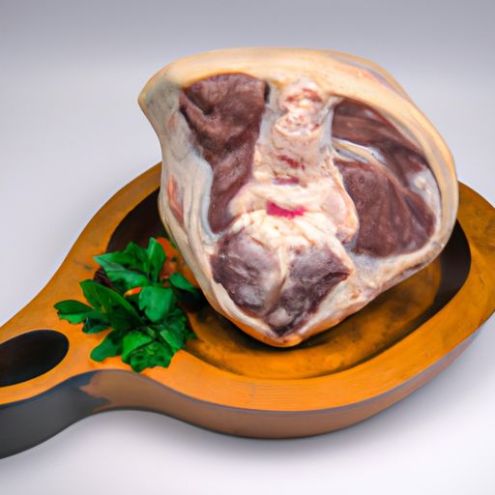Table of Contents
فوائد إضافة لحم الماعز إلى نظامك الغذائي
في الختام، يعتبر لحم الماعز خيارًا مغذيًا ولذيذًا لأولئك الذين يتطلعون إلى تنويع نظامهم الغذائي وجني فوائد هذا البروتين الخالي من الدهون. بفضل محتواه العالي من البروتين والعناصر الغذائية الأساسية ونكهته الفريدة، يعد لحم الماعز مكونًا متعدد الاستخدامات يمكن الاستمتاع به في مجموعة متنوعة من الأطباق. سواء كنت تتطلع إلى تحسين صحتك، أو اتباع نظام غذائي حلال، أو دعم الممارسات الزراعية المستدامة، فإن لحم الماعز يعد خيارًا رائعًا لأي وجبة. فكر في إضافة لحم الماعز إلى نظامك الغذائي واستمتع بالفوائد العديدة التي يقدمها هذا اللحم اللذيذ.
أهمية شهادة الحلال في صناعة اللحوم

في صناعة اللحوم، تلعب شهادة الحلال دورًا حاسمًا في ضمان تلبية منتجات اللحوم للمتطلبات الغذائية للمستهلكين المسلمين. شهادة الحلال هي عملية اعتماد تتحقق من أن اللحوم قد تم إعدادها وفقًا لقوانين النظام الغذائي الإسلامي. هذه الشهادة مهمة للمستهلكين المسلمين الذين يلتزمون بإرشادات غذائية صارمة ويستهلكون اللحوم الحلال فقط. للشريعة الإسلامية. تتضمن شهادة الحلال إجراء فحص شامل لعملية إنتاج اللحوم بأكملها، بدءًا من تربية الحيوانات وحتى تجهيز اللحوم وتعبئتها. وهذا يضمن أن اللحوم خالية من أي مواد محرمة وأنه تم إعدادها بطريقة تتوافق مع قوانين الغذاء الإسلامية.
إن شهادة الحلال ليست مهمة فقط للمستهلكين المسلمين، ولكنها تلعب أيضًا دورًا مهمًا. دور في صناعة تصدير اللحوم. تتطلب العديد من الدول شهادة الحلال لمنتجات اللحوم ليتم تصديرها إلى البلدان ذات الأغلبية المسلمة. تضمن هذه الشهادة أن اللحوم تلبي المتطلبات الغذائية للمستهلكين المسلمين ويمكن أن يستهلكوها بأمان.
تتضمن عملية الحصول على شهادة الحلال فحصًا شاملاً لعملية إنتاج اللحوم بأكملها. ويشمل ذلك التأكد من تربية الحيوانات وذبحها بطريقة إنسانية وأخلاقية، وتغذيتها بنظام غذائي حلال، وخلوها من أي مواد محرمة. يتم أيضًا فحص مرافق معالجة وتعبئة اللحوم للتأكد من استيفائها للمعايير التي حددتها قوانين النظام الغذائي الإسلامي.
تعتبر شهادة الحلال مهمة لضمان جودة منتجات اللحوم وسلامتها. ومن خلال الحصول على شهادة الحلال، يمكن لمنتجي اللحوم إثبات التزامهم بإنتاج منتجات لحوم عالية الجودة وآمنة وحلال. تساعد هذه الشهادة أيضًا على بناء الثقة بين المستهلكين المسلمين، الذين يمكن التأكد من أن اللحوم التي يستهلكونها تلبي متطلباتهم الغذائية.
بالإضافة إلى تلبية المتطلبات الغذائية للمستهلكين المسلمين، تلعب شهادة الحلال أيضًا دورًا في تعزيز الأخلاقيات. والممارسات المستدامة في صناعة اللحوم. من خلال ضمان تربية الحيوانات وذبحها بطريقة إنسانية وأخلاقية، تساعد شهادة الحلال على تعزيز رفاهية الحيوان واستدامته في عملية إنتاج اللحوم.
بشكل عام، تعد شهادة الحلال جانبًا مهمًا من صناعة اللحوم التي تضمن الجودة والسلامة. وامتثال منتجات اللحوم للقوانين الغذائية الإسلامية. وتعد هذه الشهادة ضرورية لتلبية المتطلبات الغذائية للمستهلكين المسلمين، وضمان جودة منتجات اللحوم وسلامتها، وتعزيز الممارسات الأخلاقية والمستدامة في صناعة اللحوم. يُظهر منتجو اللحوم الذين يحصلون على شهادة الحلال التزامهم بإنتاج منتجات لحوم عالية الجودة وآمنة وحلال تلبي احتياجات المستهلكين المسلمين.
The Importance of Halal Certification in the Meat Industry
In the meat industry, halal certification plays a crucial role in ensuring that meat products meet the dietary requirements of Muslim consumers. Halal certification is a certification process that verifies that the meat has been prepared according to Islamic dietary laws. This certification is important for Muslim consumers who adhere to strict dietary guidelines and only consume halal meat.
Meat Goat Meat sheep halal certification food meat export quality with bone Beef is essential for ensuring that the meat is prepared in a way that is permissible according to Islamic law. Halal certification involves a thorough inspection of the entire process of meat production, from the rearing of the animals to the processing and packaging of the meat. This ensures that the meat is free from any haram (forbidden) substances and that it has been prepared in a way that is in accordance with Islamic dietary laws.
Halal certification is not only important for Muslim consumers, but it also plays a significant role in the meat export industry. Many countries require halal certification for meat products to be exported to Muslim-majority countries. This certification ensures that the meat meets the dietary requirements of Muslim consumers and can be safely consumed by them.
The process of obtaining halal certification involves a thorough inspection of the entire meat production process. This includes ensuring that the animals are raised and slaughtered in a humane and ethical manner, that they are fed a halal diet, and that they are free from any haram substances. The meat processing and packaging facilities are also inspected to ensure that they meet the standards set by Islamic dietary laws.
Halal certification is important for ensuring the quality and Safety of meat products. By obtaining halal certification, meat producers can demonstrate their commitment to producing high-quality, safe, and halal meat products. This certification also helps to build trust and confidence among Muslim consumers, who can be assured that the meat they are consuming meets their dietary requirements.
In addition to meeting the dietary requirements of Muslim consumers, halal certification also plays a role in promoting ethical and sustainable practices in the meat industry. By ensuring that animals are raised and slaughtered in a humane and ethical manner, halal certification helps to promote animal welfare and sustainability in the meat production process.
Overall, halal certification is an important aspect of the meat industry that ensures the quality, safety, and compliance of meat products with Islamic dietary laws. This certification is essential for meeting the dietary requirements of Muslim consumers, ensuring the quality and safety of meat products, and promoting ethical and sustainable practices in the meat industry. Meat producers who obtain halal certification demonstrate their commitment to producing high-quality, safe, and halal meat products that meet the needs of Muslim consumers.

